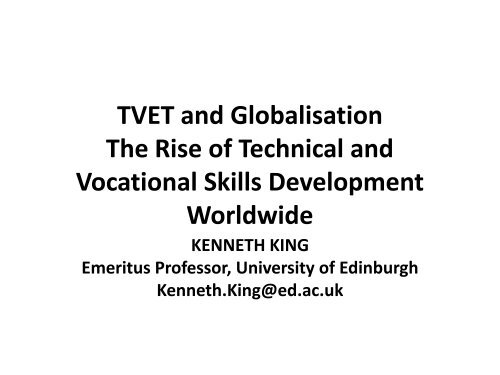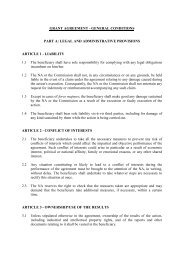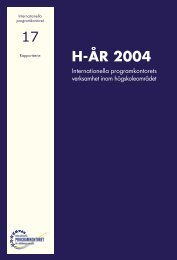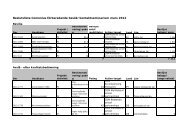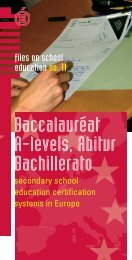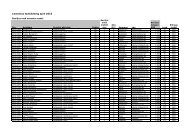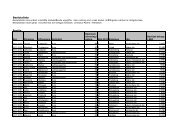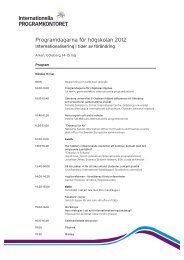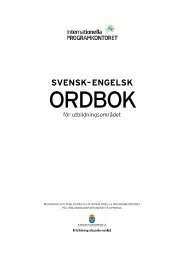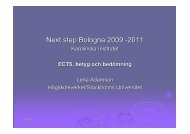TVET and Globalisation The Rise of Technical and Vocational Skills ...
TVET and Globalisation The Rise of Technical and Vocational Skills ...
TVET and Globalisation The Rise of Technical and Vocational Skills ...
You also want an ePaper? Increase the reach of your titles
YUMPU automatically turns print PDFs into web optimized ePapers that Google loves.
<strong>TVET</strong> <strong>and</strong> <strong>Globalisation</strong><br />
<strong>The</strong> <strong>Rise</strong> <strong>of</strong> <strong>Technical</strong> <strong>and</strong><br />
<strong>Vocational</strong> <strong>Skills</strong> Development<br />
Worldwide<br />
KENNETH KING<br />
Emeritus Pr<strong>of</strong>essor, University <strong>of</strong> Edinburgh<br />
Kenneth.King@ed.ac.uk
Presentation Outline<br />
• Changing global agendas. Fashions, drivers,<br />
meanings<br />
• <strong>The</strong> <strong>Skills</strong> Year - 2012<br />
• <strong>Skills</strong> <strong>and</strong> Education for All (EFA) from Jomtien<br />
to the present day<br />
• <strong>Skills</strong>-<strong>and</strong>-poverty versus <strong>Skills</strong>-<strong>and</strong>-growth<br />
• <strong>TVET</strong> reform initiatives – health warnings
2012 <strong>TVET</strong>’s Turn Worldwide<br />
• After 10 years the Global Monitoring Report<br />
(GMR) reviews skills. Launch September 2012.<br />
Focus on <strong>TVET</strong> for marginalised youth<br />
• Also, UNESCO sponsors World <strong>TVET</strong> Report.<br />
Launch at the Third International Congress on<br />
<strong>TVET</strong> in Shanghai May 2012. Focus on the<br />
need for a new paradigm<br />
• See NORRAG News 46 for latest update on<br />
<strong>TVET</strong> worldwide (www.norrag.org)
Don’t neglect <strong>TVET</strong> history!<br />
• <strong>The</strong> origins <strong>of</strong> aid (1949) <strong>and</strong> the transfer <strong>of</strong><br />
‘technical knowledge’ – Truman<br />
• <strong>The</strong> role <strong>of</strong> aid agencies in promoting <strong>TVET</strong><br />
from 1950s – ILO <strong>and</strong> UNESCO turf wars<br />
• <strong>The</strong> role <strong>of</strong> the World Bank (WB) –from 1963<br />
to 1979 – <strong>TVET</strong> yes! Rather than<br />
‘dysfunctional’ general secondary education<br />
• Foster <strong>and</strong> the <strong>Vocational</strong> School Fallacy<br />
(1965) – famous but no influence on policy!
<strong>TVET</strong> <strong>and</strong> aid architecture,<br />
80s <strong>and</strong> 90s<br />
• From structural adjustment to rights-based<br />
approaches<br />
• World Conference on Education for All – big<br />
impact on <strong>TVET</strong><br />
• <strong>The</strong> rise <strong>of</strong> WB “theology” <strong>of</strong> rate <strong>of</strong> return<br />
• <strong>The</strong> WB’s 1991 <strong>TVET</strong> policy – negative impact<br />
• Specially on aid-dependent countries –not<br />
PRC<br />
• De Moura Castro’s classic quote (NN18)
Return <strong>of</strong> <strong>TVET</strong> to agency <strong>and</strong><br />
government agendas, 1999-2012<br />
• International Congress on TVE (T) 1999 Seoul<br />
• <strong>TVET</strong> alive <strong>and</strong> well in E. & SE Asia: e.g. China<br />
• Revisiting <strong>and</strong> discovering <strong>TVET</strong> in the aid world<br />
• UNESCO new <strong>TVET</strong> policy 2009<br />
• Global Monitoring Report to treat Dakar Goal 3<br />
(2000) :<br />
“equitable access to appropriate learning <strong>and</strong><br />
life skills programmes”<br />
<strong>TVET</strong> terminology has been very problematic!
Multiple meanings <strong>of</strong> skill in<br />
basic <strong>and</strong> post-basic education<br />
• Core skills (3Rs, ICT, texting & emailing &<br />
twittering) in basic education (BE) <strong>and</strong><br />
post-BE<br />
• New skills, s<strong>of</strong>t skills, higher order skills in<br />
BE <strong>and</strong> post-BE<br />
• Attitudinal skills e.g. confidence, hard<br />
work, perseverance in BE <strong>and</strong> post-BE<br />
• Traditional technical <strong>and</strong> vocational<br />
manipulative & design skills in post-BE<br />
• Entrepreneurial & employability skills<br />
• Western <strong>and</strong> Eastern meanings <strong>of</strong> skills??
THE DIFFERENT WORLDS<br />
OF LIFE SKILLS AND WORK<br />
SKILLS?<br />
• Life skills as psycho-social <strong>and</strong><br />
interpersonal<br />
• Close links to health, <strong>and</strong> protection from<br />
diseases, including AIDS<br />
• Livelihood <strong>and</strong> work skills link to<br />
enterprise <strong>and</strong> employability<br />
• Complementarity <strong>of</strong> life, livelihood <strong>and</strong><br />
work skills?
Global drivers <strong>of</strong> skills<br />
• Quantitative success <strong>of</strong> EFA leads to<br />
interest in <strong>TVET</strong> <strong>and</strong> sec. schooling<br />
• <strong>Skills</strong> for poverty reduction<br />
• <strong>Skills</strong> within sector-wide approaches<br />
• Politics <strong>of</strong> skills-for-employment <strong>and</strong><br />
skills-for-security (anti-terror)<br />
• <strong>Skills</strong> for enterprise productivity,<br />
competitiveness <strong>and</strong> individual prosperity<br />
• But what about skills for human<br />
development – not just for jobs & work?
Skill links to poverty reduction, youth<br />
unemployment & social cohesion<br />
• Who gets skills? NOT the poor, marginalised,<br />
<strong>and</strong> women<br />
• What does it mean to acquire skills – if low<br />
quality, poor teachers, no work links?<br />
• What impact <strong>of</strong> skills on employment, poverty<br />
<strong>and</strong> social cohesion?<br />
• Need an enabling, dynamic <strong>and</strong> meritocratic<br />
economy
<strong>Skills</strong> <strong>and</strong> Growth?<br />
• Four years <strong>of</strong> education make a difference to<br />
farmer productivity? Under what conditions?<br />
• <strong>Skills</strong> make a difference to productivity? Under<br />
what conditions?<br />
• If disabling local environment, what about<br />
skills for migration? Malawi, Pol<strong>and</strong>,<br />
Bangladesh, Philippines, Indonesia<br />
• <strong>Skills</strong> export for remittances? Bangladesh et al
<strong>TVET</strong> Reform Initiatives<br />
Panaceas vs Health Warnings<br />
• Being aware <strong>of</strong> the slippery language –just 3<br />
examples out <strong>of</strong> 11 in the IIEP Fundamental<br />
• From supply-driven to dem<strong>and</strong>-driven <strong>TVET</strong>?<br />
• Towards portability <strong>of</strong> skills, CBT, <strong>and</strong> NQFs?<br />
• Towards vocationalisation <strong>of</strong> secondary<br />
education? What evidence from Nordics?<br />
• Reforms will be much easier when economies<br />
are growing –China, S. Korea, Mozambique
<strong>TVET</strong> Tips for Planners <strong>and</strong> Politicians<br />
• Context, culture <strong>and</strong> history matter<br />
• <strong>Skills</strong> don’t equal jobs. Avoid productivism!<br />
• <strong>Skills</strong> for poverty reduction? But massive <strong>and</strong><br />
growing rich/poor disparities<br />
• Skill acquisition – not same as skill utilisation<br />
• <strong>Skills</strong> <strong>and</strong> the MDGs? – the pursuit <strong>of</strong> no single<br />
sector like primary school will secure goals<br />
• INTERSECTORALITY ESSENTIAL
Further Reading<br />
• For Fundamental 94:- www.iiep.unesco.org<br />
• For further treatment <strong>of</strong> <strong>Skills</strong> – look out for<br />
the Global Monitoring Report <strong>of</strong> 2012 -<br />
www.unesco.org/en/efareport<br />
• For critical analysis <strong>of</strong> education <strong>and</strong> skills<br />
http://www.norrag.org/resources/publication<br />
s – See NORRAG website-for 12 years <strong>of</strong> <strong>Skills</strong><br />
Working Group Reports<br />
• See NORRAG News 46 special issue on SKILLS


